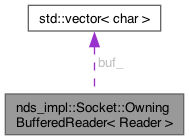#include <buffered_reader.hh>
|
| Reader | r_ |
| |
| std::vector< char > | buf_ |
| |
◆ OwningBufferedReader()
template<typename Reader >
◆ __buffered_bytes()
template<typename Reader >
A debugging function
- Returns
- Return the number of bytes in the current buffer
◆ consume()
template<typename Reader >
◆ fill_buffer()
template<typename Reader >
◆ read_available()
template<typename Reader >
A read the data that is currently available. This will only result in a read on the underlying reader if the internal buffer is empty.
- Parameters
-
| start | Start address of the destination |
| end | Address of the byte past the last in the destination |
- Returns
- A pointer in [start, end] that is the next location
◆ read_exactly()
template<typename Reader >
Read exactly enough data to fill the range [start,end)
- Parameters
-
| start | Start of the destination |
| end | Byte just past the end of the destination |
- Returns
- end
◆ read_until()
template<typename Reader >
template<typename It >
Read until a value in [begin_set,end_set) is found in the input stream.
- Template Parameters
-
| It | An iterator that dereferences chars |
- Parameters
-
| begin_set | Start of the list of terminators |
| end_set | End of hte list of terminators |
- Returns
- A std::vector<char> of the data that was read in, including the terminator that was found.
This will retrieve data from the underlying reader as needed
◆ write_all()
template<typename Reader >
Write data through to the underlying reader object.
- Parameters
-
| start | Bytes to start at |
| end | Address just past the last byte to send |
◆ buf_
template<typename Reader >
◆ r_
template<typename Reader >
The documentation for this class was generated from the following file:
